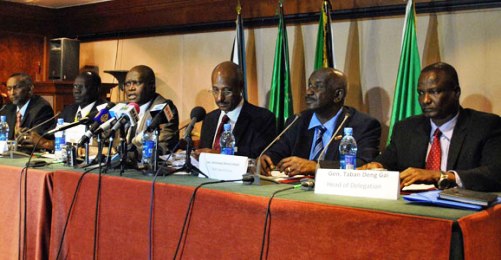US urges talks on political reforms in South Sudan amid IGAD demand for inclusive process
January 31, 2014 (ADDIS ABABA) – The US special envoy to the two Sudans, Donald Booth, has urged South Sudan’s government to engage in talks on political reforms, pointing out that governance issues that caused the current armed conflict need to resolved to achieve lasting peace.

Since violence broke out in the new nation in mid-December, Booth has worked together with the Inter-Governmental Authority on Development (IGAD) mediators to end hostilities between the two warring parties.
The new nation needs to “establish frameworks and principles for creating more democratic institutions”, said Booth in statements to the press on the sidelines of an IGAD summit on Friday in the Ethiopian capital to discuss the six-week-old conflict.
Booth said questions around the formation of more meaningful institutions, governance, social structure, and the organisation of political parties in South Sudan needed to be addressed, adding that these “fundamental questions should be embodied in the constitution of the country”.
The US special envoy’s statements reflect the dominant idea in Washington that the current crisis unfolded due to South Sudan’s lack of necessary constitutional and institutional structures allowing a democratic and transparent governance.
“The current crisis brings home the fact that South Sudan’s political institutions were much too weak and unable to manage the competing ambitions and other demands of a new state. Its army – more a coalition of competing militias than a unified military – fragmented in the crisis,”, former US special envoy to Sudan and South Sudan Princeton Lyman wrote in an article for the New York Times.
Booth and the US ambassador to South Sudan, Susan Page, met president Barak Obama on 24 January after the signing of a cessation of hostilities agreement and briefed him on the deal. The meeting further discussed the steps forward needed to restore peace and stability in the world’s newest nation.
US officials were criticised by lawmakers and commentators for failing to avert the armed conflict and ignoring different warning signs that had emanated from Juba prior to the outbreak of violence.
IGAD WANTS INCLUSIVE PROCESS
Meanwhile, regional leaders from IGAD have demanded that talks on political reforms in South Sudan be inclusive and provide an opportunity for nationwide consultations on the political agenda of the peace process.
At an extraordinary summit to discuss the South Sudan crisis, regional bloc leaders, directed their three mediators tasked with monitoring the peace process to develop an inclusive framework for upcoming negotiations.
IGAD special envoys have been asked to “develop a framework for the next phase of negotiations in South Sudan, including specific modalities on structure, representation, and timeframe, so as to ensure dialogue is truly inclusive,” a statement released at the end of the summit said.
IGAD leaders further directed mediators to ensure that “such a framework is developed with a view to involve a broad range of South Sudanese government, political, and civil society actors in a reinvigorated constitutional process”.
Summit participants also welcomed the commitment of president Salva Kiir and the rebel SPLM/A in Opposition to widen consultations with all stakeholders in order to ensure an inclusive process to resolve the conflict.
In line with these commitments, IGAD leaders tasked mediators with organising a series of public consultations with a variety of South Sudanese actors “with the aim of generating input for a framework of political dialogue and national reconciliation”.
The consultations are expected to include political parties, traditional and religious leaders, business communities and other stakeholders, as well as groups representing women, youth, intellectuals, refugees and internally displaced people.
(ST)
